Operatoonity.com review: Silent Night presented by Glimmerglass Festival
Live performance: Sunday, July 22, 1:30 p.m.
Alice Busch Opera Theater, Cooperstown, New York
Music: Kevin Puts
Libretto: Mark Campbell
3.5 out of 5.0 stars

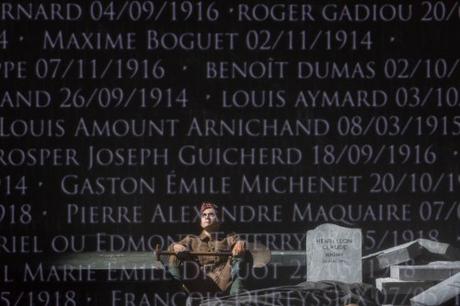
Christian Sanders as Jonathan Dale in The Glimmerglass Festival’s 2018 production of Kevin Puts and Mark Campbell’s “Silent Night.” | Photo: Karli Cadel/The Glimmerglass Festival
The names of English, French and German soldiers who perished from 1914-18 and their death dates scroll down a stage-wide scrim to open the show. Behind the scrim are headstones of dead soldiers, scattered about the stage like piles of rubble. The director of the Glimmerglass Festival’s new production of Silent Night, Tomer Zvulun, served as a combat infantry unit medic in the Israeli Army for three years. He stated in the program booklet that he believes every war is futile, and that this production offers a chance to find humanity in war.
While Zvulun succeeded in his vision for the show, and the approaching centenary of the armistice that ended World War I (November 11, 1918) is a fine reason for staging Silent Night, Festival organizers undercut the power and strength of the production during the performance I attended by stating that today’s show was “dedicated to the service of all veterans.”
This reviewer has seen a few contemporary works in the operatic genre that are decidedly anti-war. Cold Mountain is one. Silent Night (as produced by Opera Philadelphia) was another. Many other classic works are capable of being infused with anti-war leanings, depending on what statement the director and artistic team want to make, such as last season’s The Siege of Calais, directed by Francesca Zambello.
Interpretations of art fall differently on viewers, depending on their filters. To someone whose father and father-in-law served in World War II and whose brother is an Army vet, dedicating a production to veterans that is centered on the futility of war proved offensive. Is there a living veteran who served his/her country who is of sound mind or with any pride intact who wants to believe their service meant nothing? That the losses of their friends and family members mean so little that their headstones can be symbolically cast about the stage like construction detritus? Had organizers allowed the set piece below to make a statement without their editorial intrusion, a set piece intrinsic to the integrity of the production as conceived, that would not have offended this reviewer.
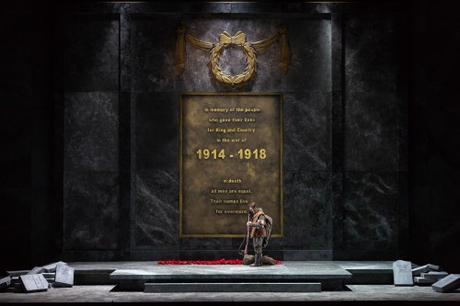
One of the earliest scene sets in the production. | Photo: Karli Cadel/The Glimmerglass Festival
Glimmerglass Festival, you can’t have it both ways. Make your anti-war statement and revel in it. Or produce George M! and hang your hat on it.
Back to the review … Silent Night recounts the spontaneous cease-fire on Christmas Eve of 1914 between the Germans and French and Scottish allies in Belgium. During the first act, all the soldiers surrender their weapons to observe a night of peace instead of perpetuating their deadly combat. In this telling, the temporary armistice was instigated by an opera singer who was called to fight. The soldiers celebrate mass and sing carols. The next day they bury their dead. When high command learns about the unsanctioned truce, the commanding officers and soldiers are reprimanded and punished for committing treasonous acts. All armies involved sought to cover up the incident, but many may have heard of this Christmas truce through a popular folk tune heard around Christmas in the last decade or so called “Christmas in the Trenches” by John McCutcheon. “In a flare-lit soccer game, we gave ’em hell…” McCutcheon’s song goes. A bit of soccer is played in this production, but the press photos did not capture that particular scene to share in this review.
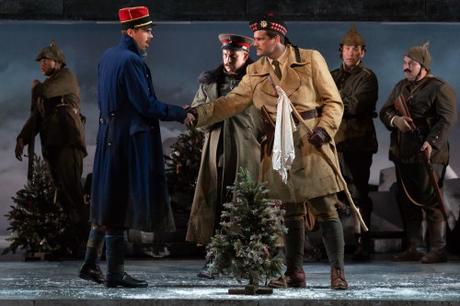
Michael Miller as Lieutenant Audebert, Michael Hewitt as Lieutenant Horstmayer and Jonathan Bryan as Lieutenant Gordon in “Silent Night.” Photo: Karli Cadel/The Glimmerglass Festival
Despite the stacked set offering three levels of simultaneous stage action upstage, the littered headstones were ever-present in every scene and every act. That being said, superior production values and the strength of the ensemble cast delivered a deeply moving show when carved out from the context I objected to earlier in this review.
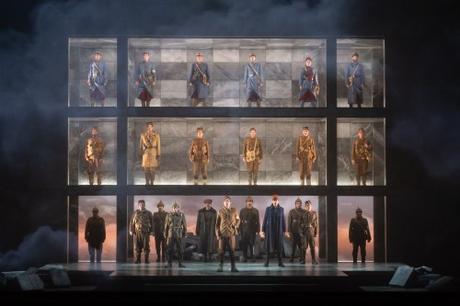
Three-level scenery for the new production was conceived by designer Erhard Rom. | Photo: Karli Cadel/The Glimmerglass Festival
In addition to remarkable scenery is the fact that the opera was written to be sung in multiple languages: French, German, English and even a bit of Latin (during the Christmas mass), all of which are subtitled in English. That’s a brilliant feature of the show with such a modern and logical sensibility that’s hard-wired into the production by Composer Kevin Puts and Librettist Mark Campbell.
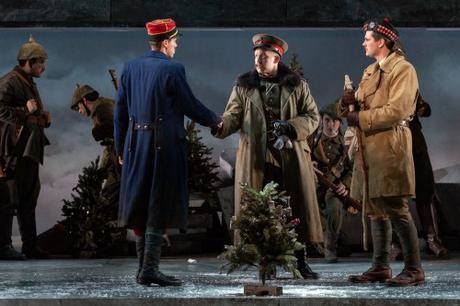
L to R: Michael Miller as Lieutenant Audebert, Michael Hewitt as Lieutenant Horstmayer and Jonathan Bryan as Lieutenant Gordon in “Silent Night.” Photo: Karli Cadel/The Glimmerglass Festival
Nearly every role in Silent Night was performed by a Young Artist, who thus far this season have proved an amazingly talented and versatile group of performers, collectively delivering a powerful show, earning them a standing ovation that afternoon.
A few standout performances deserve special mention. In the French camp, Michael Miller as French Lieutenant Audebert and Conor McDonald as Ponchel had a compelling scenes together. Their war-forced friendship comprised some heartwarming scenes in a very sober show.
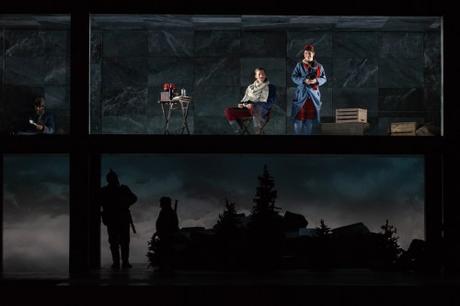
Michael Miller as Lieutenant Audebert and Conor McDonald as Ponchel. | Photo: Karli Cadel/The Glimmerglass Festival
Even though the cease-fire offers the soldiers a reprieve from trench warfare, the Yuletide observance is likewise sober, to chilling effect. Ideally cast as Father Palmer, Wm. Clay Thompson delivers a Christmas mass in Latin for soldiers from all three camps. For some of those on bended knee, it would be their last religious service.
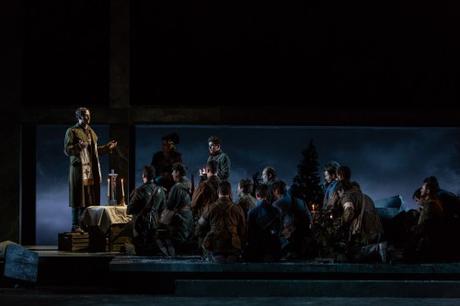
L to R: Wm. Clay Thompson as Father Palmer with the ensemble. | Photo: Karli Cadel/The Glimmerglass Festival
Even the “Dona nobis pacem” sung to conclude the mass by Young Artist Mary Evelyn Hangley as the German opera singer wasn’t composed to bathe the soldiers in the peace of Christ. It was stridently pitched in a stratospheric range and sung as a desperate plea: “Give us peace, save these precious lives.”
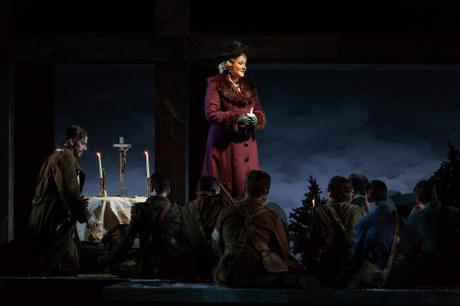
L to R: Wm. Clay Thompson as Father Palmer and Mary Evelyn Hangley as Anna Sørensen | Photo: Karli Cadel/The Glimmerglass Festival
The most compelling performances came from two Young Artists. Arnold Livingston Geis portrayed the German opera singer Nikolaus Sprink who bravely (or foolishly, at his own peril) reminded the Kronprinz of the futility of war when called back from the front to perform for the Prince with his girlfriend (Hangley).
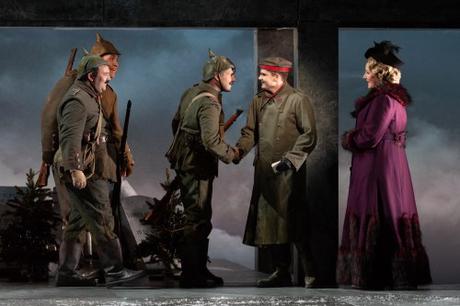
Maxwell Levy, Stephen Martin and Charles H. Eaton as German soldiers with Arnold Livingston Geis as Nikolaus Sprink and Mary Evelyn Hangley as Anna Sørensen | Photo: Karli Cadel/The Glimmerglass Festival
The other standout was Christian Sanders as Scotsman Jonathan Dale, who heads to the front with his brother William. William is shot and killed early on, and a mentally tortured Jonathan keeps up the pretense that his brother still lives in correspondence home and nearly gets himself killed trying to bury him.
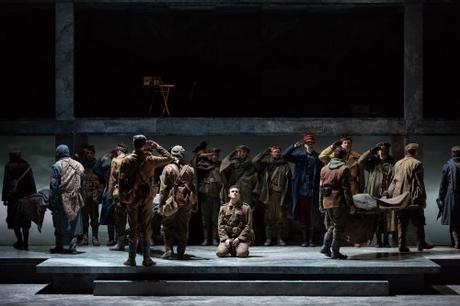
The cease-fire allowed all three camps to carry off their dead before resuming fighting. Christian Sanders as Jonathan Dale (center) | Photo: Karli Cadel/The Glimmerglass Festival
The libretto is remarkable–an extremely complex undertaking for the librettist that imparts a simultaneous and ready understanding of the interaction within and among three camps in three languages for the audience. The trio of central stories representing three cultures, the crux of the story–are powerful. Composer Puts music received a Pulitzer Prize in 2012 for this opera, which was his debut work.
The show is well executed and worth seeing because of its unique values and underlying themes.

